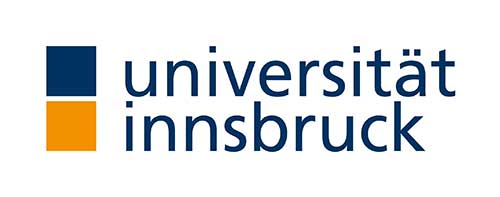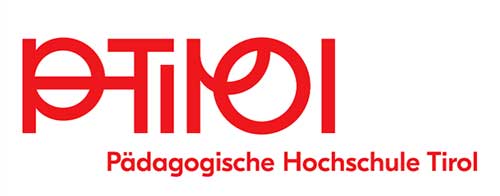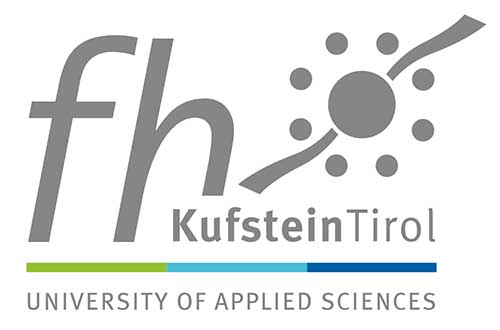Three academic institutions - at six locations
Thanks to the association of three Tyrolean universities and the cooperation with associated partners, the INNALP Education Hub combines professional expertise and state-of-the-art infrastructure of the region. The bundling and joint use of existing resources contribute to an optimal and sustainable use of investments and enable a low-threshold exchange of know-how among the project participants, as well as a cost-effective scientific monitoring of the test phase. The results and products of the hub will not be "shelved", but implemented in the regional education system in the long term through the integrated network of education actors.
Brief presentation of the institutions and departments involved

University of Innsbruck (UIBK)
UIBK
The University of Innsbruck is the largest and most important research and educational institution in western Austria. Since its foundation, it has been a supporting pillar of Tyrolean society, economy and politics. It sees its central tasks in research and development as well as in teaching and further education. In both areas, it aims on the one hand to deepen its regional roots and on the other hand to secure a significant place in the European higher education area.
ILS
At the Institute for Teacher Education and School Research (ILS), central issues of school, teaching, education and learning research are addressed and dealt with theoretically, empirically and with a focus on the practice of teaching. The institute's research focuses on general didactics and school pedagogy, inclusive pedagogy, teacher education research, pedagogical diagnostics as well as school development research and leadership. In addition, the ILS is responsible for the pedagogical and practical training of all students of the Secondary School Teacher Training (General Education) in the Teacher Training Association West.
IFD
https://www.uibk.ac.at/ifd/index.html.en
The Department of subject-specific Education bundles research related to subject-specific learning and teaching in different, changing educational contexts in an interdisciplinary institute. This includes theoretical modelling and empirically based research on aspects of guided and unguided acquisition and assessment of subject-related competences. In addition, the Department of subject-specific Education is responsible for the research-based subject didactic teacher training and further education of 15 of the 27 teaching subjects and specialisations in the Teacher Training Association West.
II
https://www.uibk.ac.at/informatik/
The Institute of Computer Science (II) unites eleven research groups with different research focuses. The research groups "Intelligent and Interactive Systems (IIS)" and "Quality Engineering (QE)" are particularly involved in the INNALP Edu Hub. The IIS working group deals with systems that interact with their physical environment in complex ways. An important motivator is autonomous robots with applications in household, services, science and humanitarian missions.
The research group QE develops innovative methods and tools to improve quality and cost efficiency in the management, design and operation of software systems. One focus is on model-based techniques and the topics of requirements management, model-based quality assurance, security engineering, business processes and workflows.
IMGK
https://www.uibk.ac.at/medien-kommunikation/
At the Department of Media, Society and Communication (IMGK), media dynamics are researched in social contexts. The focus is on questions in the area of tension between media culture, education, knowledge, political and social communication. The institute's concerns also include public exchange on current media topics, the social interference of media technology developments, the linking of theoretically motivated and practice-relevant problems as well as questions of methodological approaches to current challenges.

University College of Teacher Education Tyrol (PHT)
PHT
The University College of Teacher Education Tyrol (PHT) sees itself as a cosmopolitan educational campus for all pedagogical professional fields and stands for research- and practice-oriented training, continuing education and further education. The professional research at the University College of Teacher Education Tyrol is characterised by a strong theory-practice transfer. The research projects focus on subject didactics, education for sustainable development, professional research, elementary education as well as primary school research and cross-sections.
IFE
The Institute for Subject Didactic and Educational Research and Development is concerned with questions about early childhood education in the elementary sector, primary and secondary education, and teacher training in a wide variety of contexts. The continuous development and validation of the various research methods is one of the core tasks of the institute. The main focus is on research and development in subject didactics and educational sciences, as well as the transfer of the knowledge gained into initial, further and continuing training at the University College of Teacher Education Tyrol and into educational practice.
IDBQ
The Institute for Digitisation, Education for Sustainable Development and Quality Development provides essential development, testing and transfer services for the implementation of the PHT's strategy in the aforementioned fields of action. It is responsible for the development and implementation of the PHT's internationalisation concept, as well as the goals for education for sustainable development according to the 2030 Agenda and the further development of quality management at the University.

University of Applied Sciences Kufstein (FHK)
FHK
https://www.fh-kufstein.ac.at/eng/
The University of Applied Sciences Kufstein Tyrol offers international degree programmes for future-oriented professions. It stands for innovative economic and technical-business degree programmes and has received several awards for the high quality of its education. The FHK attaches great importance to practical relevance and internationality in teaching and research. The university's focus on sustainability and the future is reflected in its research focus on people and digitalisation, with its respective manifestations in technology, business and society.
HUMAN-BEHAVIOR-LAB
https://www.fh-kufstein.ac.at/Human-Behavior-Lab
Digital human behaviour research at the FHK provides a comprehensive view into the emotions and behaviour of people. The Human Behaviour Lab investigates issues surrounding the use of advertising materials, product placements, websites, apps and other touchpoints and how these can be optimised for the target group. The Human Behaviour Lab has a strong outward orientation and cooperates with actors from society, business and science.
LEAN-LAB
https://www.fh-kufstein.ac.at/Studieren/Master/ERP-Systeme-Geschaeftsprozessmanagement-BB/LEAN-Lab
The LEAN Lab is an innovative learning factory in which methods for achieving operational excellence are clearly taught. The aim is to teach these improvement approaches to students as well as to managers and employees of the companies. The LEAN-LAB includes workplaces with mechanical processing as well as assembly workplaces that can be flexibly linked together and where a real product is manufactured.
MAKERS-LAB
https://www.fh-kufstein.ac.at/Studieren/Bachelor/Wirtschaftsingenieurwesen-VZ/Makers-Lab
Implement your own ideas and immediately hold the result in your hands: This is the motto of the Makers Lab at FH Kufstein Tirol, which is available to students and staff. The equipment in the lab makes it possible to test concepts and create prototypes right up to the final product and even small series. All the essential steps of product development can be carried out here.
AUTOMATION-LAB
https://www.fh-kufstein.ac.at/Studieren/Bachelor/Wirtschaftsingenieurwesen-VZ/Automation-Lab
In the Automation Lab, a wide range of robots, electronic workstations, measuring devices, soldering stations and a production line with electropneumatic components are available. This makes it possible to experience automation topics at first hand.
SPS
https://www.fh-kufstein.ac.at/Studieren/Master/Smart-Products-Solutions-BB
The focus Smart Products & Solutions deals with basic questions of digitalisation in the business world. The focus is on the development of smart products and related issues such as simulation and modelling methods, design aspects as well as ensuring product quality and assessing the associated risks.
WING
https://www.fh-kufstein.ac.at/Studieren/Bachelor/Wirtschaftsingenieurwesen-VZ
The industrial engineering major deals with interdisciplinary issues from a technical, economic and social perspective. Research subjects are the creation process of technical products, as well as their development and production. By using a wide range of laboratories with state-of-the-art infrastructure, students are prepared for the working world in the best possible way and research projects are implemented.
ERP & GPM
https://www.fh-kufstein.ac.at/Studieren/Master/ERP-Systeme-Geschaeftsprozessmanagement-BB
The focus Enterprise Resource Planning Systems & Business Process Management deals with the basic issues of every company. Fields of work in business administration and management are thereby linked to the implementation of ERP systems and process improvement methods and concepts are developed.




